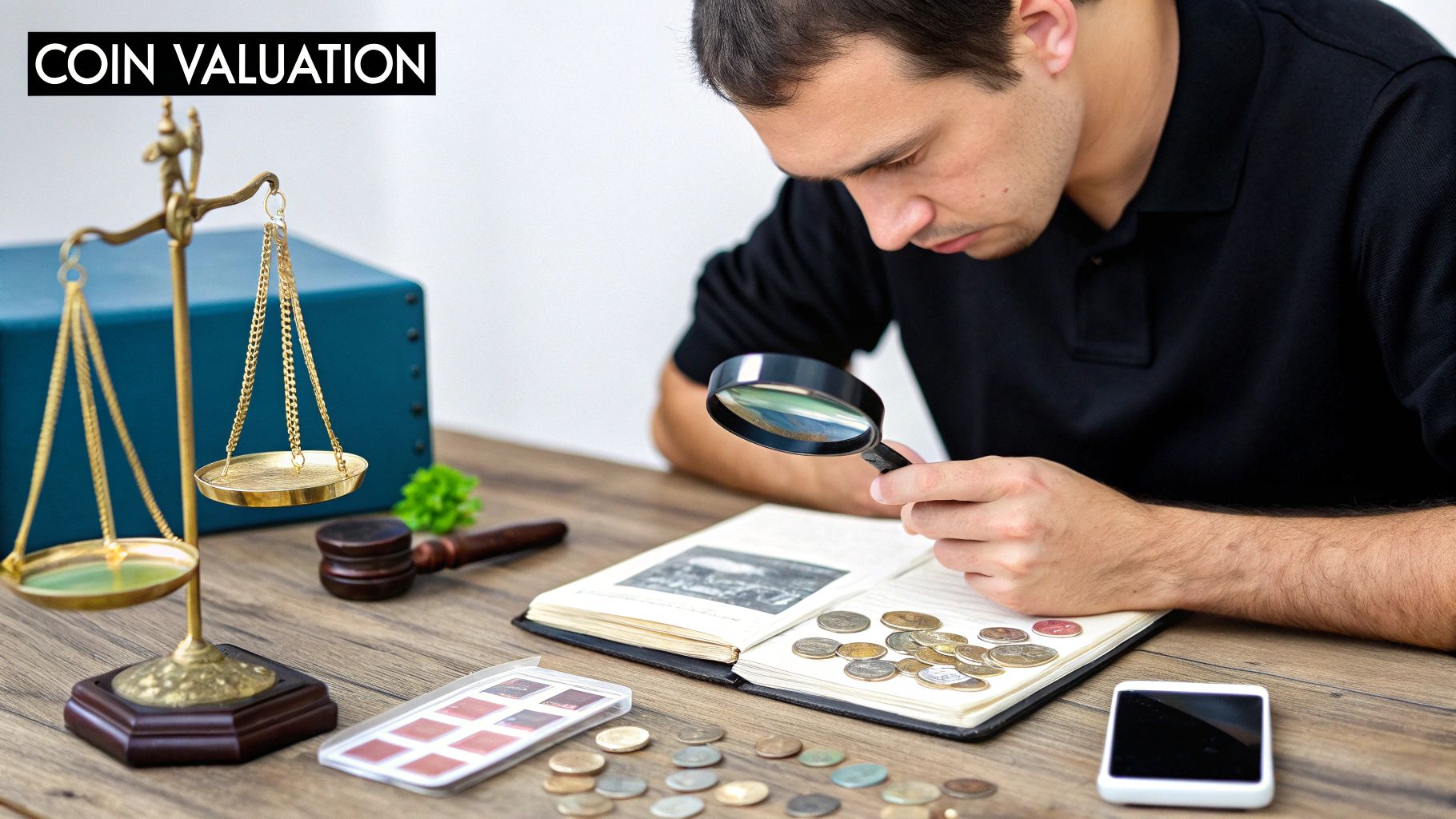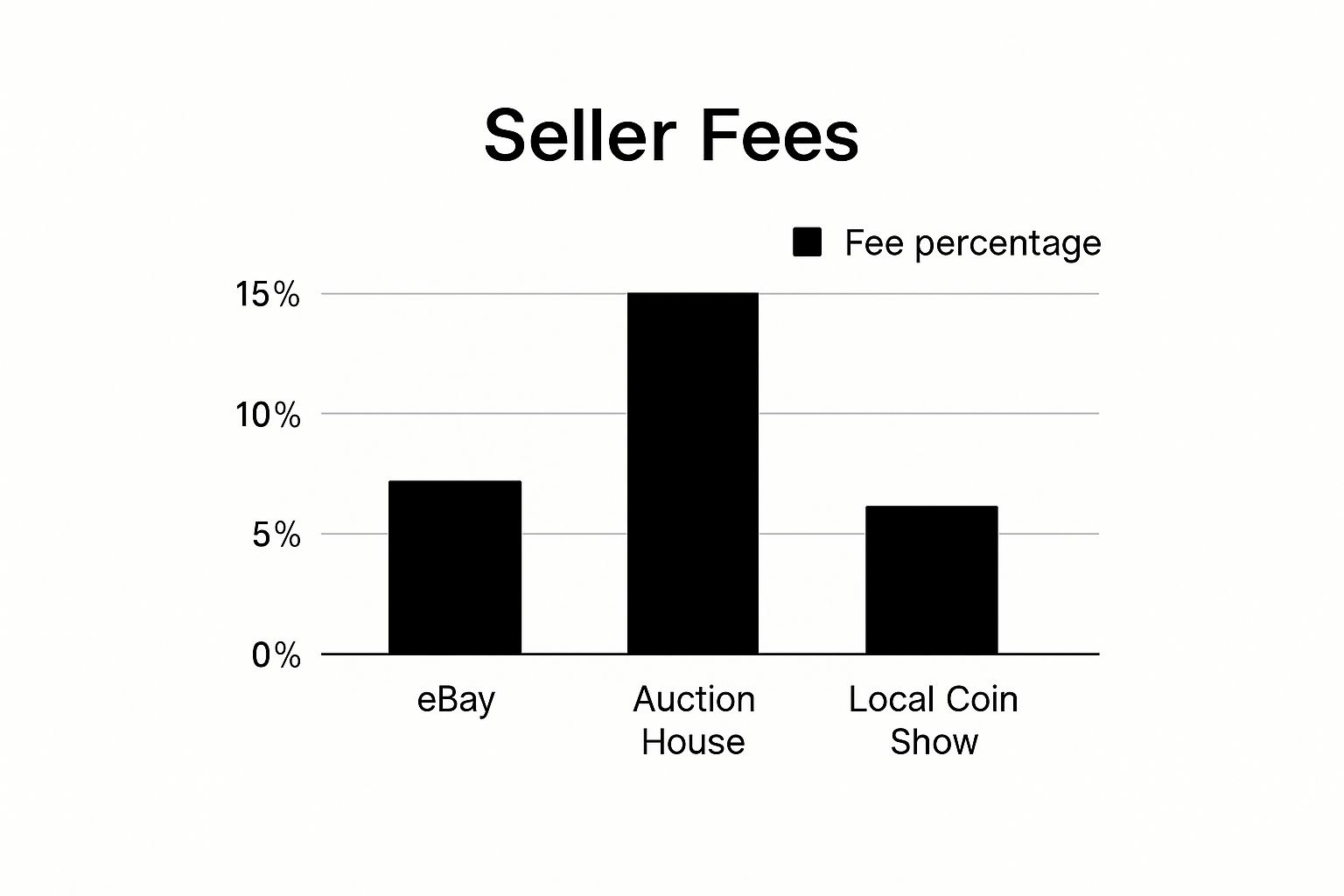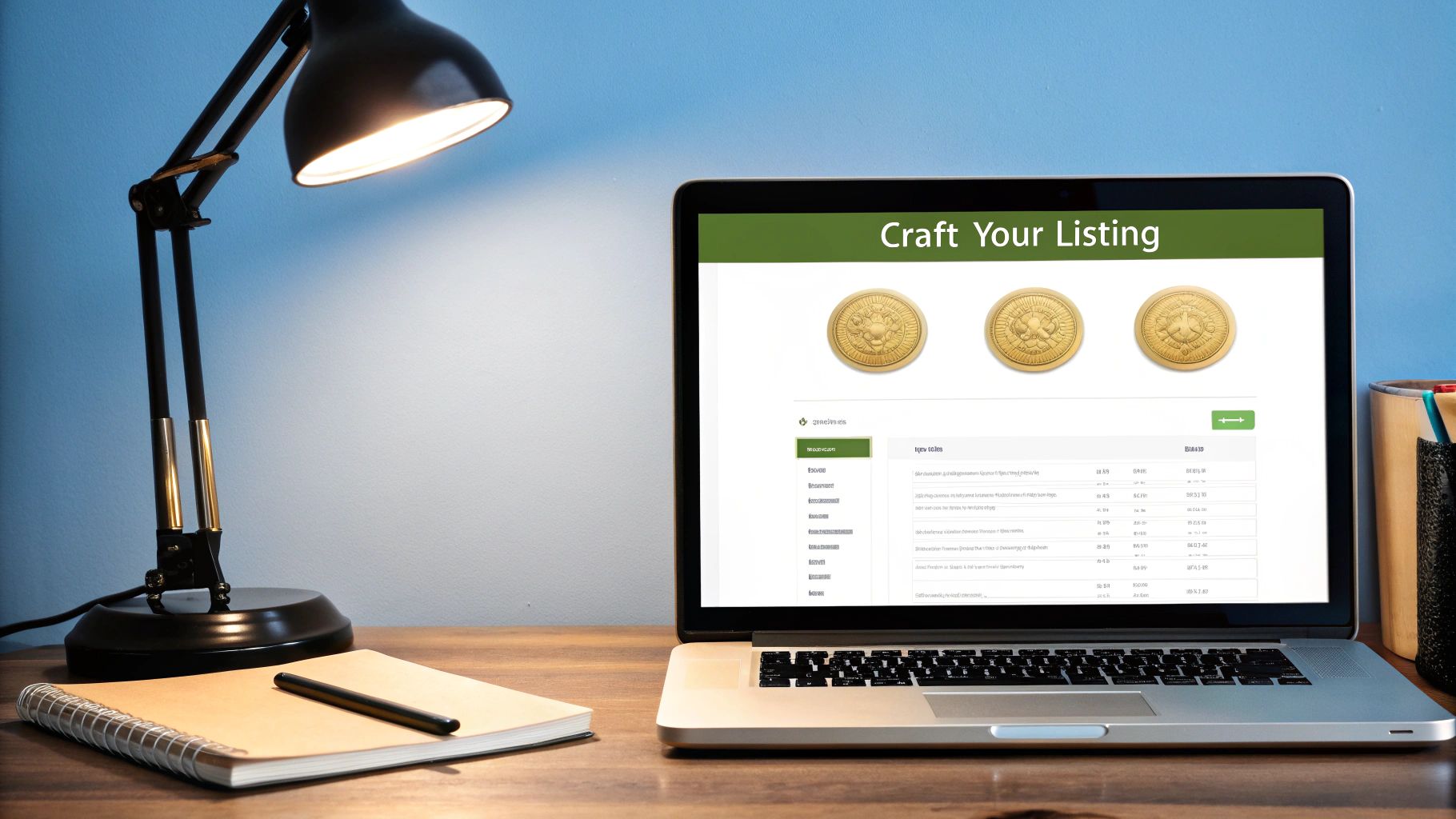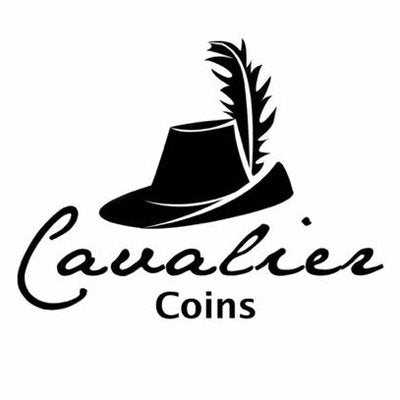Understanding What Makes the UK Coin Market Tick

The UK coin market is a fascinating blend of the traditional and the modern. The enduring appeal of historic British coins is undeniable. However, the rise of digital assets is changing the way we buy and sell coins, presenting interesting opportunities for sellers who understand these shifts.
The Rise of Digital Assets
The arrival of cryptocurrencies has created a parallel market that impacts the traditional coin scene. Selling coins now encompasses both physical and digital assets. This isn't just a temporary fad; digital currencies are reshaping finance. The UK's digital asset economy, including cryptocurrencies, is expanding rapidly. Forecasts predict the UK cryptocurrency market could reach US$1.6 billion by 2025. This growth reflects increasing trading volumes and growing interest in digital currencies. You can explore this further here. Despite this digital surge, the traditional coin market remains strong, especially for collectors seeking tangible pieces of history.
Traditional Coin Values
For those focused on physical coins, understanding the UK numismatic market is key. Some British coins are seeing a surge in demand due to factors like historical significance, rarity, and condition.
- Historical Significance: Coins from specific eras, such as pre-decimalisation or those commemorating important events, often command higher prices.
- Rarity: The scarcity of a particular coin significantly impacts its value. Fewer coins in circulation often translate to higher prices.
- Condition: A coin's condition plays a vital role in determining its worth. A pristine, uncirculated coin will typically be worth considerably more than a worn, circulated one.
Identifying Buyer Types
Knowing your target audience is essential for selling coins. Are you dealing with seasoned collectors, investors seeking alternative assets, or casual buyers interested in a unique piece of history? Each buyer type has different motivations and price sensitivities.
- Collectors: Often prioritize rarity, historical significance, and condition.
- Investors: May be more focused on potential appreciation and market trends.
- Casual Buyers: Might be driven by aesthetic appeal or a connection to a particular historical period.
Tailoring your approach to the specific audience is crucial for a successful sale.
Market Psychology and Timing
Understanding market psychology is a powerful tool. Recognizing genuine market demand versus temporary hype can be the difference between a profitable sale and a disappointing outcome. Timing also matters. Seasonal patterns can influence prices, and capitalizing on periods of high demand can maximize returns. The coin market, like any market, experiences fluctuations. Staying aware of these shifts offers a significant advantage. By understanding these market dynamics, you can position yourself strategically for the best possible results.
Getting Your Valuation Right (Without Expensive Mistakes)

This chart compares seller fees across different platforms: eBay, Auction Houses, and Local Coin Shows. Local Coin Shows stand out with only 5% seller fees. This contrasts sharply with eBay's 10% and Auction Houses' 15%.
This cost-effectiveness makes local shows appealing, especially for higher-value coins where maximizing profit is key. However, if you're aiming to reach a wider audience, consider exploring online platforms or auction houses.
Spotting Key Dates and Varieties
Accurate valuation is the cornerstone of successful coin selling. This goes beyond simply consulting a general price guide. It requires a keen eye for key dates. These are specific years when fewer coins were minted, significantly impacting their value.
For example, a 1933 penny holds significantly more value than pennies from 1932 or 1934 due to its scarcity. Beyond key dates, be on the lookout for varieties within a given year. Even subtle design differences can dramatically alter a coin's worth. This is where meticulous research truly pays dividends.
Understanding Coin Grading
A coin's condition, in addition to rarity and variety, plays a crucial role in determining its value. A pristine, uncirculated coin commands a higher price than a worn, circulated one. Learn how to master coin valuation.
Grading systems, such as the Sheldon scale used in the UK, categorize coins based on their condition. Understanding these standards is essential. Accurate grading ensures you price your coins fairly, attracting buyers without undervaluing your collection.
To further illustrate how condition affects value, let's look at a comparison table:
Coin Condition Grades and Value Impact
Comparison of how different condition grades affect coin values, showing percentage differences from base value
| Condition Grade | Description | Value Multiplier | Typical Premium |
|---|---|---|---|
| Poor (P-1) | Heavily worn, barely identifiable | 0.1x | -90% |
| Fair (F-2) | Very worn, most major details visible | 0.25x | -75% |
| Good (G-4) | Worn, but design and date are clear | 0.5x | -50% |
| Very Good (VG-8) | Moderately worn, some details softened | 1.0x | 0% |
| Fine (F-12) | Well-worn, but all details are clear | 2.0x | +100% |
| Very Fine (VF-20) | Lightly worn, most details sharp | 4.0x | +300% |
| Extremely Fine (XF-40) | Minor wear, nearly all details sharp | 8.0x | +700% |
| About Uncirculated (AU-50) | Slight traces of wear, almost perfect | 12.0x | +1100% |
| Uncirculated (MS-60) | No wear, possible minor imperfections from minting | 20.0x | +1900% |
As you can see, the condition significantly impacts the value multiplier and the premium. A coin in Mint State can be worth 20 times more than a coin in Very Good condition.
Researching Actual Selling Prices
While catalogue values offer a baseline, researching actual selling prices provides a more accurate market value. Online marketplaces like eBay and specialized coin auction sites are valuable resources. They offer insights into real-world transactions.
In the UK, resources like the ‘British Coins Market Values 2025’ offer comprehensive pricing data. This guide, updated annually, reflects common dealer selling prices across Great Britain. You can explore this guide further here. Such research strengthens your pricing strategy.
Professional Grading Services: When Are They Worth It?
For high-value coins, particularly those potentially graded above Very Fine, consider professional grading services. While there's a cost involved, the added assurance for buyers can justify the expense. This certification can significantly boost the final selling price.
Think of it like an independent appraisal for a house: it adds credibility and reassures potential buyers, ultimately leading to a better return on your investment.
Choosing Your Battlefield: Where Smart Sellers Go

Selling coins effectively hinges on selecting the right platform. There's no single perfect solution; different venues offer distinct advantages and drawbacks depending on your goals and the coins you're selling. A poor choice can significantly impact your profits. This section explores key considerations for UK coin sellers.
Online Marketplaces: Balancing Reach and Fees
Online marketplaces like eBay offer a vast audience and are relatively easy to use. However, they come with listing fees and commissions, often around 10%. This can affect profits, especially for lower-value coins. Secure transactions and fraud protection are also vital considerations.
Auction Houses: For the Discerning Collector
Traditional auction houses attract serious collectors and can fetch high prices for rare or valuable coins. However, they also command higher commissions, typically around 15%, and may have stricter listing requirements. The selling process can also be lengthy, with coins potentially unsold for weeks or even months.
Local Coin Shows and Dealers: The Personal Touch
Local coin shows and established UK coin dealers offer a more personal approach. This allows direct interaction with buyers and often involves lower selling fees. Building relationships with reputable dealers can lead to smoother transactions and better prices over time. You might be interested in: How to master selling your coins. However, the audience reach is generally smaller than online platforms.
Specialist Online Platforms: Finding Your Niche
Specialized online coin platforms cater to serious collectors, potentially yielding higher returns for specific coin types. These platforms often have a more targeted audience and may offer features like secure escrow services. Thorough research is crucial to ensure the platform's legitimacy and reputation, especially for high-value coins.
Building Direct Collector Relationships: The Profit Maximizer
Developing relationships directly with collectors can be very profitable, eliminating intermediary fees and allowing for personalized sales. Networking through coin clubs and online forums can be valuable. This approach, however, requires time and effort to build trust and a strong reputation.
Choosing the Right Fit
The ideal platform depends on several factors:
-
Coin Type: Rare coins may fare better at auction houses or specialist platforms, while common coins might do well on online marketplaces or with local dealers.
-
Your Selling Goals: For quick sales, online marketplaces are generally faster. To maximize profit, consider auction houses, specialist platforms, or direct sales.
-
Your Comfort Level: Some sellers prefer the ease of online platforms, while others value the in-person interaction of local shows or dealers.
Carefully consider these factors to choose the selling venue that maximizes your returns and suits your selling style. Informed decisions are the key to successful coin selling.
Presentation Secrets That Command Premium Prices
Selling coins successfully hinges on presentation. A well-presented coin can fetch a premium, while a poorly presented one might not sell at all. Here’s how to showcase your coins for maximum impact, using techniques employed by top UK dealers.
Photography: Highlighting Key Features
Professional photographs are crucial for online coin sales. Use a macro lens to capture intricate details and ensure images are sharp and well-lit. A lightbox can help control lighting and minimize reflections.
-
Lighting: Soft, diffused lighting works best. Avoid harsh direct light, which creates glare and obscures details.
-
Background: A neutral, non-reflective background, like plain black or white, keeps the focus on the coin.
-
Angles: Photograph multiple angles to showcase the obverse, reverse, and the coin’s edge.
Documentation: Building Buyer Confidence
Detailed descriptions and documentation build trust. Clearly state the coin's denomination, year, mint mark (if any), and condition. Include close-ups highlighting unique features or imperfections.
-
Grading: If professionally graded, prominently display the certification. This adds credibility, especially for high-value coins.
-
Provenance: If known, include the coin’s history in the description. A compelling provenance can add significant value.
-
Authenticity Guarantee: Offering an authenticity guarantee reassures buyers, particularly in private sales.
Storage and Shipping: Protecting Your Investment
Proper storage and shipping protect coins in transit and preserve their condition. Use non-PVC coin holders to prevent damage and tarnishing. Package coins securely to avoid movement and damage during shipping.
-
Holders: Choose inert, archival-quality holders designed for coins. Avoid adhesive or PVC materials.
-
Packaging: Use padded envelopes or small boxes to protect coins during shipping. Secure the holders to prevent shifting.
-
Insured Shipping: Always insure valuable coins to protect against loss or damage.
Crafting Compelling Descriptions
Go beyond a simple list of specifications. Craft a narrative that highlights the coin’s unique features and historical significance. Engage the buyer and create a sense of value. You might find this helpful: Where to sell old coins.
-
Storytelling: Weave a narrative around the coin’s historical context or design. This can significantly increase its perceived value.
-
Keywords: Use relevant keywords in your descriptions to improve online search visibility. Consider how buyers might search for your coin.
-
Honesty: Be upfront about any imperfections or damage. This builds trust and prevents disputes.
By following these presentation tips, you can significantly enhance your coins’ perceived value and maximize your selling returns. Presentation is key to attracting buyers and commanding premium prices in the competitive UK coin market.
Pricing Psychology and Negotiation Wins
Setting the right price for your coins isn't just about knowing the market rate. It also involves understanding buyer psychology and smart negotiation tactics. This means grasping how buyers perceive value and using that to your advantage. Let's explore some proven pricing frameworks employed by successful UK coin sellers.
Researching Comparable Sales
Begin by thoroughly researching comparable sales. Online marketplaces like eBay and dedicated coin auction sites offer a wealth of information. Focus on recently sold coins in similar condition to yours. This gives you a realistic benchmark for your own pricing. Remember, listed prices are what sellers hope to get; sold prices reflect what buyers actually paid.
Aggressive vs. Conservative Pricing
Choosing between aggressive and conservative pricing depends on your objectives. For quick sales, pricing slightly below market value can attract bargain hunters. However, if you have a rare or high-demand coin and aren't in a hurry, a more conservative approach might net you a higher final price.
Negotiation Tactics for Win-Win Outcomes
Negotiation is a key skill in coin selling. Aim for win-win outcomes where both you and the buyer feel satisfied. Be ready to compromise, but know your lowest acceptable price. Maintain politeness and professionalism throughout the negotiation.
- Handling Multiple Buyers: If several buyers express interest, subtly create a sense of urgency. Let them know there's competition without resorting to high-pressure tactics. This can encourage better offers.
- Spotting Time-Wasters: Learn to distinguish genuine buyers from those who aren't serious. Be willing to walk away from unreasonable offers. Your time is valuable.
- Creating Urgency: Phrases like “limited time offer” or “price valid until…” can be used strategically to encourage faster decisions. However, use these sparingly to avoid seeming desperate.
To help you choose the right selling platform, the following table compares several popular options for UK coin sellers:
Selling Platform Comparison for UK Coin Sellers
This table compares fees, audience reach, and suitability for various coin types across different selling platforms.
| Platform | Commission % | Audience Type | Best For | Payment Security |
|---|---|---|---|---|
| eBay | Varies by category | Broad, general audience | Common coins, quick sales | Buyer/Seller protection programs |
| Spink | Varies, typically higher | Specialist collectors, high-end buyers | Rare, valuable coins | Established auction house practices |
| Baldwin's | Varies, typically higher | Specialist collectors, investors | Rare, ancient coins | Established auction house practices |
| Private Sale | 0% | Targeted collectors, numismatic societies | Specific needs, direct negotiation | Dependent on agreed method |
Key takeaways from the table include the varying commission percentages and the importance of choosing a platform that aligns with your target audience and the types of coins you're selling. For higher-value coins, consider the enhanced security offered by established auction houses.
Selling Scenarios and Secure Payments
Different selling scenarios call for different approaches. In auction environments, set a realistic reserve price. For private sales, clearly communicate payment methods and shipping costs upfront. Always prioritize secure payment methods like bank transfers or established online payment platforms. Buyer protection is essential, especially for high-value transactions.
Consider using escrow services for added security. This protects both buyer and seller, ensuring a smooth transaction and releasing funds only when both parties are satisfied.
By understanding these pricing and negotiation strategies, you can confidently navigate the UK coin market and maximize your profits. Remember, selling coins is more than just a transaction; it's about connecting with fellow collectors and sharing the passion for numismatics.
Staying Legal and Keeping HMRC Happy

Selling coins can be a rewarding hobby, but understanding the legal and tax implications within the UK is essential. This ensures a smooth and hassle-free experience, keeping you on the right side of HMRC. This section outlines the key aspects to consider when selling your coins.
Capital Gains Tax: When Does it Apply?
Profit from selling coins might make you liable for Capital Gains Tax (CGT). This tax applies if your profit exceeds the annual CGT allowance, currently set at £12,300. The tax isn't calculated on the coin's face value, but on the increase in value since you acquired it. It's similar to selling property – you only pay CGT on the difference between the buying and selling prices.
Record-Keeping: Essential for HMRC Compliance
Accurate record-keeping is paramount for coin sellers. HMRC requires detailed documentation of all transactions, including purchase and sale dates, prices, and associated costs like grading or shipping. These records are not merely a suggestion but a critical component of demonstrating compliance and avoiding potential penalties. A simple spreadsheet can be a highly effective tool for managing this information.
Occasional Selling vs. Trading: Understanding the Difference
HMRC differentiates between occasional sellers and traders based on the frequency and volume of your sales. Occasional selling is generally exempt from Income Tax. However, if you're regularly trading coins, HMRC might classify this as a business, making your profits liable for Income Tax. Understanding this distinction is crucial. It's akin to the difference between occasionally selling unwanted items online and operating a dedicated online store.
VAT and Consumer Protection
VAT might apply to certain coin types, such as gold coins. Additionally, consumer protection regulations are especially important when selling online. These regulations protect buyers by ensuring accurate product descriptions and fair trading practices.
International Shipping: Navigating the Regulations
If shipping coins internationally, familiarize yourself with the specific customs regulations and any restrictions that apply to exporting certain items. This proactive approach can prevent shipping delays and potential complications.
Seeking Professional Advice
For complex scenarios, like selling a large inherited collection or if your coin selling becomes a substantial activity, consulting a qualified tax advisor is highly recommended. Professional advice ensures you're fulfilling all your legal obligations while also maximizing your returns. Consider this an investment in protecting yourself against potential legal and tax issues.
Building Your Long-Term Coin Selling Success
Transforming occasional coin sales into a sustainable venture in the UK requires more than just sales know-how. It requires building a strong presence within the UK numismatic community. This involves cultivating relationships, establishing trust, and creating opportunities for repeat business.
The Power of Networking: Building Genuine Relationships
Building genuine relationships within the numismatic community is invaluable. It's not about quick transactions; it’s about fostering connections with collectors and dealers who share your passion.
-
Joining Numismatic Societies: Consider joining organizations like the British Numismatic Society or local coin clubs. These provide excellent opportunities to connect with fellow enthusiasts, learn from experienced collectors, and stay abreast of market trends.
-
Leveraging Social Media: Online platforms dedicated to coin collecting offer excellent networking opportunities. Engaging in discussions, sharing your expertise, and cultivating a positive online presence can attract potential buyers and establish you as a knowledgeable seller.
-
Attending Coin Shows Strategically: Coin shows are a chance to network face-to-face. View these as opportunities to build relationships, not just make immediate sales. Engage in conversations, exchange knowledge, and build connections that can lead to future business.
Building a Reputation: The Cornerstone of Success
A strong reputation as a trusted seller is paramount. Positive feedback, transparent dealings, and accurate descriptions build trust and encourage repeat business. Think of it as building your brand – your reputation becomes your most valuable asset.
-
Honesty and Transparency: Always provide accurate descriptions of your coins, disclosing any imperfections or damage. This builds trust and minimizes the risk of disputes.
-
Professionalism and Communication: Respond promptly to inquiries, maintain polite and professional communication, and handle transactions efficiently. These practices reflect positively on your reputation.
-
Following Through on Commitments: Deliver on your promises. If you commit to a specific price or delivery timeframe, ensure you follow through. This reliability fosters trust and encourages future interactions.
Staying Ahead of the Curve: Market Trends and Opportunities
The UK coin market is dynamic. Successful sellers stay informed about emerging trends, changing demand, and new opportunities. This allows them to adapt their strategies and capitalize on evolving market conditions.
-
Continuous Learning: Regularly research coin values, attend educational seminars, and stay updated on industry news. Knowledge is power in the coin market.
-
Identifying Niche Markets: Specializing in a particular type of coin or historical period can differentiate you and attract a dedicated customer base.
-
Networking with Experts: Connecting with experienced dealers and collectors provides valuable insights into market dynamics and emerging trends.
Reinvesting and Expanding: Scaling Your Coin Selling Venture
As your coin selling success grows, consider reinvesting profits to expand your collection and expertise. This might involve acquiring higher-value coins, pursuing specialized numismatic knowledge, or even transitioning from casual selling to serious dealing. This long-term perspective transforms coin selling from a hobby into a sustainable and potentially lucrative venture built on your passion for numismatics.
Looking to expand your collection or find rare pieces? Explore Cavalier Coins Ltd, an online retailer specializing in coins and banknotes from around the world. Whether you're a seasoned numismatist or a new collector, Cavalier Coins offers a wide selection and dedicated customer service.

